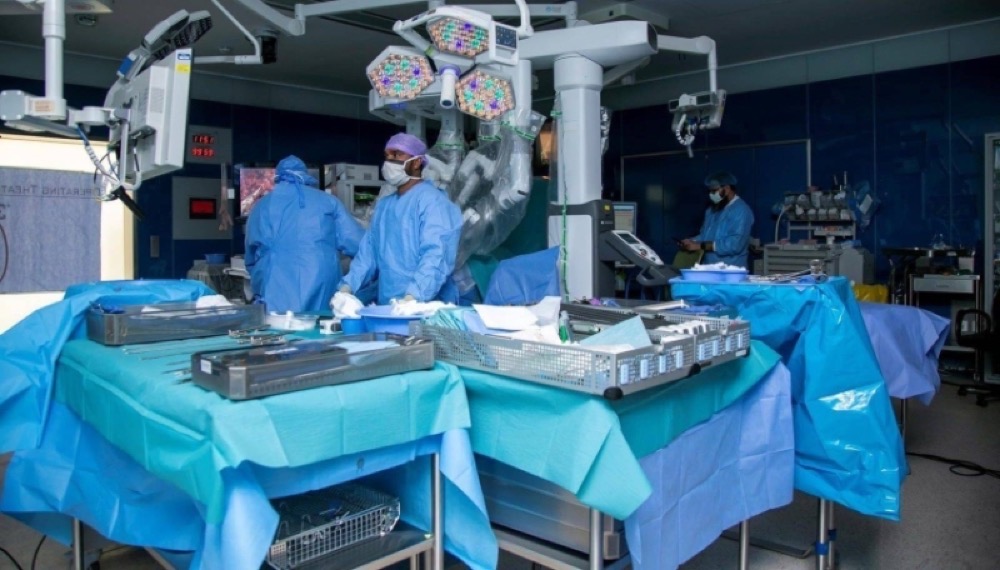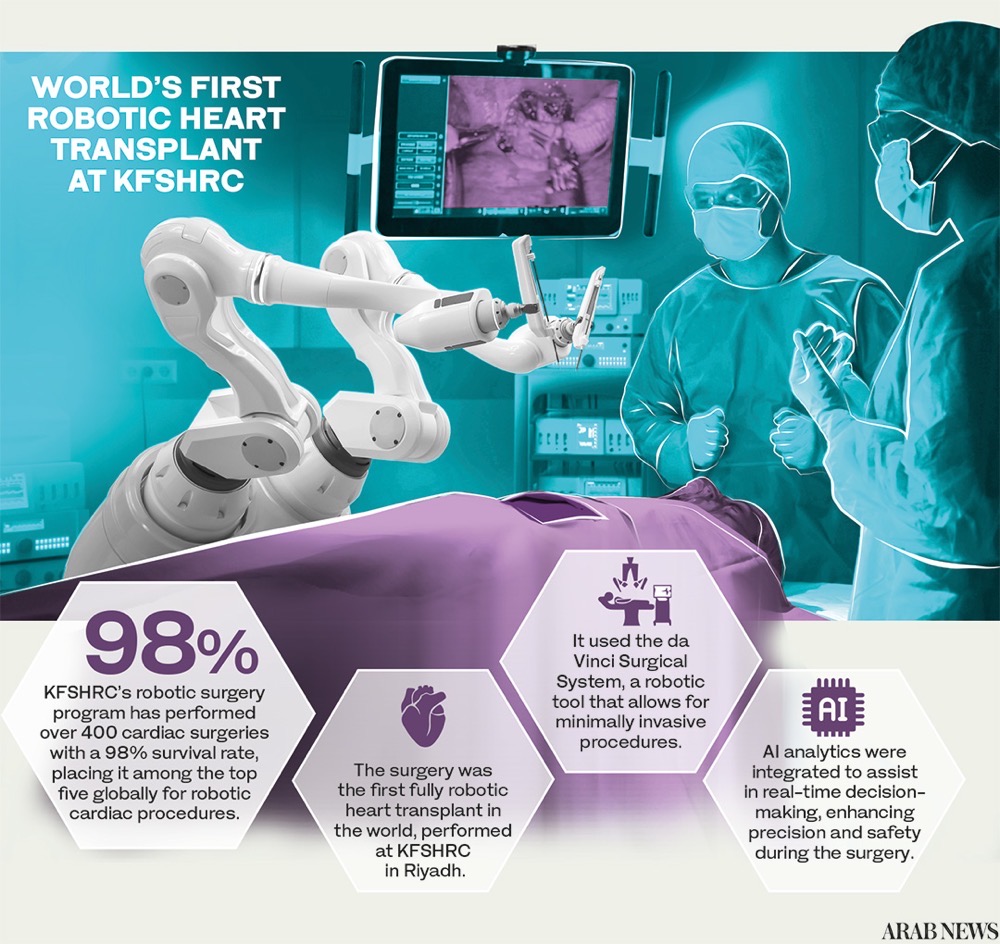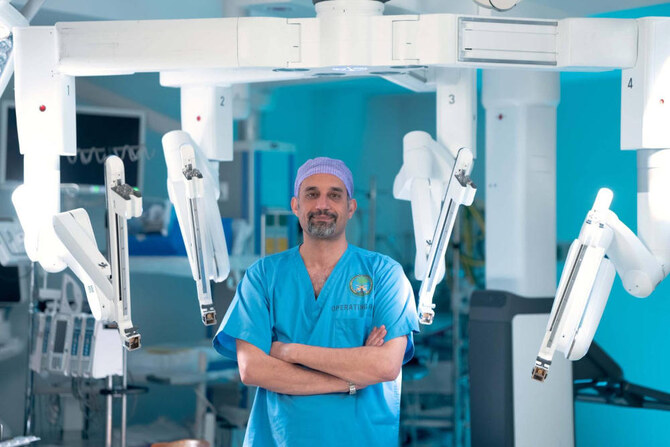RIYADH: Robots have lived among us for years, from our factory assembly lines to the autonomous vehicles sorting our parcels. Now, with rapid advances in artificial intelligence, our robot companions are taking on even more sophisticated tasks — even heart surgery.
With their precision and steadiness of hand, robots are able to perform delicate procedures often beyond the abilities of even the most skilled human surgeons, proving less invasive for the patient, offering faster recovery times, and reducing the risk of post-op infection.
According to the World Economic Forum, the market for robot-assisted surgery is expected to surpass $14 billion by 2026. Having invested heavily in health sector innovation, Saudi Arabia is already making significant strides in the adoption of AI-driven robotics in medicine.
In September, a cardiac team at King Faisal Specialist Hospital and Research Center in Riyadh achieved a historic milestone by performing the world’s first fully robotic heart transplant on a 16-year-old boy who was facing end-stage heart failure.

Dr. Feras Khaliel, head of cardiac surgery and director of the Robotics and Minimally Invasive Surgery Program at KFSHRC, said the success of the procedure represents a monumental leap in robot-assisted surgery, and highlights AI’s game-changing role.
“AI is an invaluable tool,” Khaliel told Arab News. “It allows us to process a substantial amount of data in real time, providing insights that improve our decision-making in the operating room. But it’s not replacing surgeons — it’s enhancing what we can do.”
The surgery was conducted using the Da Vinci Surgical System, a robotic platform renowned for its precision and control, developed by the US biotechnology company Intuitive Surgical.
Combined with AI, it provides real-time analytics during surgery, continuously processing data, offering clinical insights, and allowing for instant adjustments.
DID YOU KNOW?
1. Saudi Arabia performed the world’s first fully robotic heart transplant at King Faisal Specialist Hospital and Research Center.
2. The surgery used the Da Vinci Surgical System, renowned for its precision and real-time analytics.
3. Robotic surgery offers less invasive procedures, faster recovery times, and reduced post-operative risks.
4. KFSHRC ranks among the top five centers for robotic heart procedures globally, with a 98% survival rate.
Da Vinci Xi is the world’s most widely used multiport robotic surgery system, able to perform a wide array of medical procedures.
The system’s robotic arms, guided by human hands, allow doctors to operate through tiny incisions, thereby avoiding the open-chest incisions normally required for major heart surgery.
“We’ve always known the potential of robotic systems, but seeing it applied to something as intricate as a heart transplant was extraordinary,” said Khaliel. “The precision we achieved would have been impossible using conventional techniques.”
By incorporating AI, the team was able to make critical decisions with extreme accuracy, responding instantly to any changes in the patient’s condition.

To ensure the patient’s safety, the team conducted rigorous preoperative simulations, practicing the entire procedure seven times over three consecutive days. This allowed them to define every step and minimize potential complications.
Each step of the surgery was calibrated for precision. The robotic instruments underwent multiple tests to ensure optimal performance, and the team continuously monitored the data system throughout the procedure.
This minimally invasive approach not only reduced the risk of complications, but also significantly shortened the patient’s recovery time and minimized scarring, marking a major advancement in transplant surgery.
“The success of this groundbreaking surgery really came down to a few key elements; the advanced technology, meticulous planning, rigorous simulations, and flawless team coordination,” said Khaliel.
Data collected during the surgery — such as precision metrics, patient response, and system performance indicators — will be analyzed to refine future techniques. This will not only improve the robotic surgery program, but also contribute to broader research in robotic transplants.
Khaliel believes AI will play a growing role in surgery, becoming a real-time partner in the operating room, offering predictive insights and optimizing surgical pathways. Indeed, human surgeons will continue to have a place, applying their expertise and intuition.
The advent of AI-driven robotics will, however, transform how he and his colleagues work together as a team and will demand highly specialized technical skills and proficiencies in the use of advanced robotics and the ability to interpret data-driven insights provided by AI.

KFSHRC is no stranger to medical firsts. With more than 400 robotic cardiac surgeries already under its belt, the hospital ranks among the top five centers for robotic heart procedures worldwide.
Its Robotic Cardiac Surgery Program has achieved a 98 percent survival rate, performing complex surgeries such as multi-valve operations and aortic valve replacements.
The success of this latest robotic heart transplant opens the way for more complex procedures to be performed with greater safety and efficiency.
KFSHRC’s leadership in robotics and AI not only improves patient outcomes, but also positions the Kingdom as an emerging world leader in healthcare innovation.




























